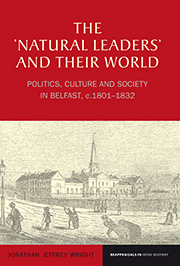Book contents
- Frontmatter
- Contents
- Acknowledgements
- Abbreviations
- Introduction
- 1 Will Tennent's band of ‘bastards and rebels’: the Tennent family in its contexts
- 2 The ‘natural leaders’, part one: politics and personalities in Belfast, c.1801–1820
- 3 The ‘natural leaders’, part two: Belfast, Europe and the age of reform
- 4 ‘The manhood of the mind’: classicism, romanticism and the politics of culture
- 5 ‘Thank-offerings to the God of providence’: philanthropy, evangelicalism and social change
- Conclusion
- Appendices
- Select Bibliography
- Index
Conclusion
- Frontmatter
- Contents
- Acknowledgements
- Abbreviations
- Introduction
- 1 Will Tennent's band of ‘bastards and rebels’: the Tennent family in its contexts
- 2 The ‘natural leaders’, part one: politics and personalities in Belfast, c.1801–1820
- 3 The ‘natural leaders’, part two: Belfast, Europe and the age of reform
- 4 ‘The manhood of the mind’: classicism, romanticism and the politics of culture
- 5 ‘Thank-offerings to the God of providence’: philanthropy, evangelicalism and social change
- Conclusion
- Appendices
- Select Bibliography
- Index
Summary
Using the Tennent family as a starting point, this study has explored the political and cultural milieu inhabited by the Presbyterian elite of late Georgian Belfast. In so doing, it has sought both to enrich, and in places challenge, the existing literature relating to Ulster Presbyterian political development in the aftermath of the Union; to reassess the significance of cultural and intellectual life in late Georgian Belfast, an area that has received little systematic study; and to examine the complex interactions of evangelicalism and philanthropy and the means by which philanthropy served as a form of social control, areas that, in the context of late Georgian Belfast, have hitherto been entirely overlooked. In addition, it has addressed a particular scholarly lacuna relating to the Tennents themselves and placed Belfast firmly within a broader British narrative, highlighting the ways in which its political and intellectual life conformed to more widespread patterns.
In addressing these areas, the study has developed a number of key arguments and themes. It has argued that William Tennent was not merely a member of the United Irishmen, as has formerly been thought, but that he was in fact one of its leading members, and has demonstrated the extent to which the Tennent family was involved in political, cultural and philanthropic activity in late Georgian Belfast. Building on existing scholarship it has, moreover, sought to illustrate the extent to which Belfast politics were, during the period 1801–32, both livelier and more complex than has previously been thought. Without doubt, the story of political transformation forms one strand of the narrative of Presbyterian politics during this period, but it is not the whole story.
- Type
- Chapter
- Information
- The 'Natural Leaders' and their WorldPolitics, Culture and Society in Belfast, c. 1801–1832, pp. 239 - 242Publisher: Liverpool University PressPrint publication year: 2013



